The coronavirus has hit every person and family around the globe, regardless of where they reside. In Dénia there is no exception, where we have had to live confinements, infections, hospitalizations and, very unfortunately, some death.
And not only has COVID attacked our health, but it has also dragged down the economy, businesses and people's way of life. In addition, there is great confusion when faced with something that we did not know and that nobody warned about.
Even today, a large number of doubts about how to act and what is happening, and will happen, around us remain to be resolved. Therefore, the mayor of Dénia, Vicent Grimalt, has given us an interview to shed some light on the confusion and to tell us how the mayor of a municipality lives something that attacks an entire planet.
QUESTION. I imagine this is being the most difficult exercise since you began to dedicate yourself to politics. What is your assessment of the City Council's performance to date during the health crisis?
ANSWER. Obviously, it has been the most difficult year we have had since I became a politician, and I think it was a long time before I became a politician. A situation like this had never happened.
On the assumption that no one, no one, was prepared to face a situation like this, obviously at first you are very disoriented. Because you have to do what the central government or the Ministry says, the City Council was not prepared at a technical and computer level to work from home, the measures are so new and surprising that it takes a lot to adapt... But hey, in the end everyone working long hours, not only politicians but also technicians and City Council officials, we quickly got to work and in a few weeks we were working almost normally.
What happens is that it is such a complex situation, and with so many side effects, that it is not easy to manage.
P. Besides the issue of having to work from home, what do you think has been the hardest moment for the municipal management of the state of alarm and the new normal?
R. They are different moments. On the one hand, when they tell you that a person you liked or knew has died because of COVID. On the other hand, when you realize the socioeconomic repercussions that this situation brings, with so many families who are having a bad time and you know that for many months they will have a bad time.
You face this situation when you come "from having come out", in quotes, from the crisis of 2008, that the recovery was beginning to be seen and we were back to stability, and suddenly they hit you with a host like this and you are totally misplaced.
P. Sure, because it was not expected.
R. None expect this. We are not the first in the Universe. "We are the first world. Whatever happens in Africa or some Asian countries ... Okay, well. But us? Aren't we the coolest?" Well, no.
In the end you realize that we are all the same and that a virus like this does not differentiate a first world, a second, a third or a fourth. It affects everyone equally and we are just as weak in front of a world, that we are the ones who are loading the environment and nature. Here the manipulation is done by the human being, not by any other animal species.
P. One of the things that have surprised me has been that, the amount of explanations that are asked of leaders, even of towns, when it is something that has hit in all corners at the same time. But of course, there is a lot of tension, I imagine.
R. There is a lot of tension because people have been taken as they have been. In the festive world, for example, it is not that it only affects those who go to party, but that it hits those who make Moorish costumes, music bands or those who shoot rockets. This drags everything down.
Also, at the work level, obviously when businesses close or companies close, you say: "and at the end of the month, what am I going to do?" No matter how much aid has been received. But it is not something that the central government, which is the one that had the baton to direct and give the instructions, has been done better or worse.
Faced with a situation like this that nobody expects, that nobody has in their script of what can happen, any country in Europe, in this case, reacts the same. He started hitting super hard in Italy and then it came to us. No one here has been without a serious problem.
"It is such a complex and extraordinary situation that we had to face it together"
And on top of that when they come out brainless like the Prime Minister of the United Kingdom who tells you: "I'm cooler than anyone else and it won't happen to me." Or that of the United States, another mindless, or that of Brazil, because this is already going up in the air. But within the same parameters in terms of rulers and countries, the effects have been more or less the same.
Q. We have noticed little political activity these months. Do you think there has been good synergy between the government and opposition team to help manage the situation?
R. Yes, we must recognize, and it is true, that since March 14 we have held many meetings with the spokesmen of the different political groups where the Government team has tried, and I think we have succeeded, to give all the information we had and try to reach a consensus on all the measures that have been taken, especially financial aid, with all the spokespersons and the corporation. Because we think that it is such a complex and extraordinary situation that we had to face it together.
When you talk about health, I don't think it's a matter of doing health politics. If not, you have the example of what is happening in Madrid with that girl who is President, who every time she opens her mouth the bread rises. I think that here we all have to go hand in hand to find solutions to help people.
P. Returning to the issue of tension that is noticeable in the street, also in Dénia. You sentís supported by neighbors?
R. We feel supported by the vast majority of the neighbors. It is also true that there is always a percentage of the neighbors who, as they are against everything, because they don't care if you argue that the sun rises through the sea and hides over the mountains. They'll even discuss that, right?
There is always a sector of people who are against what you are doing. But I am convinced that the vast majority of the people of Dénia ... It is not a matter of evaluating, but that they have accepted the measures because there was no other solution.
P. One of the most difficult issues, which has received both criticism and praise, has been the policy of saving the summer and tourism by being more permissive in terms of restrictions. Many businessmen, however, have assured that it has been a good summer within all limits. Do you agree?
R. We do not have the data of the boxes that an establishment makes. We have data on the consumption of water or the tons of garbage that are collected. At that level it is true that It has been very similar to the summer of 2019. And from what some entrepreneurs tell us, possibly people have consumed more than in the summer of 2019.
"We cannot say that it does not come to the owner of an apartment"
In addition, the majority has been national tourism. That for one thing.
That we have allowed them to come? Let's see, as soon as the state of alarm was raised, we cannot say that it does not come to the owner of an apartment. When mobility between provinces is allowed, people have come to seek their second residence and we cannot prevent them from coming.
Then other people have come who have valued spending their holidays in an apartment or in an individual chalet more than in a hotel. Those are the people who have come.
What has increased the number of infections? Well that was to be expected. But it is not that it has risen here, it is that it has risen throughout Spain, whether they have tourism or not. Because we from the Mediterranean are the way we are, and we really like to go out, move around, get together, celebrate things ... And that is what has led us to this situation.
The famous second wave that they announced to us and that's it. We got it.
P. It is hard to think that the latest infection data for the last fortnight of August are not related to the occupation that has occurred. Could more have been done in Dénia to avoid the situation? For example in Xàbia were more restrictive at first with the gauges of their beaches.
R. Xàbia, in relation to Dénia, has a disadvantage and that is that they have very few kilometers of beach. We are 20. I do not believe that not a single contagion has occurred from being on the beach. In beach hours! Because another thing is to be at night making bottle.
What we cannot do is prevent people from circulating, because we do not decree the laws. We mark the gauges, they have been controlled, they have been respected 90% of the time and that is what there has been.
I have been to the beach a little, but when I have gone I have seen that people, MarinesShe was very distant and respecting the lines marked to do one thing or the other.
The cases of contagions that we have, I would say that, if not 100%, 95% are from people from Dénia. They are not the outsiders who have been infected and have stayed here. No, the infections are from people here. And if we traced where they have been and what they have done, maybe we would be surprised by those outbreaks that have occurred in groups and on social issues.
Because in the end, what has brought the least problems, also because it was closed at the time, has been nightlife. All the outbreaks that exist are social, family and work. Therefore, we should not blame the tourism that has come, far from it.
P. Along these lines, many times young people have been identified as also guilty. On the other hand, in the Valencian Community, the young group is not the one that registers the most infections, but corresponds to people between 40 and 60 years old.
R. Here it is not a question of throwing the blame on one or the other. What is clear is that the people who have been reported for making bottles were not 60-year-olds. They were young people.
But it is not a question of blaming him. People have been infected by the meetings they hold. And a person who is 40 years old goes to a disco the same as one who is 20. And if they have been infected there, they have been infected the same.
It must also be taken into account that young people, luckily, are more asymptomatic than older people. It may be that those asymptomatic have been with family, or elsewhere, and have infected others. But I don't think the question is to find the culprit.
The only culprit there is is a bug called COVID and that is causing us destruction on a social, economic and health level, which is the most important thing. But not only in Dénia, nor in the Valencian Community, nor in Spain, but throughout the world.
They report no one for being 20 years old and being infected. What is being denounced is people who do not wear masks or even people who, knowing that they have tested positive, are going down the street. That is what you have to pursue. But the rest It is not a question of looking for guilty or in age ranges or in anything. But it is true that in health matters it affects an older person more than a younger person.
P. Be that as it may, there are more infections, although now it seems that it is improving slightly, but it is still worrying. Are you shuffling any more restrictive measure in Dénia?
R. We do not have the capacity to consider any more restrictive measure or implement it. The Ministry of Health and Justice are those who take these measures. We can only continue hammering on all channels and networks so that people fulfill what they have to fulfill.
"The hospital continues in a fairly stable situation"
Q. I was referring to measures like the one El Verger started closing the playgrounds, or like yours in the middle of summer, when you decided to cancel various cultural events.
R. We canceled the Vora Mar Cinema and the parades of the music band those two weeks in which the number of infections soared. Because we had to take some kind of measure. They are the only ones we have taken. What have they served or not? Well, we don't know, but at least you have prevented people from concentrating on the same point.
Q. Have you talked to Marina Salud y Salud Pública lately? What do they transfer you?
R. We speak with them and with the other mayors on Fridays at noon. Last week we were transferred that it seemed that it was stabilizing, but that did not mean that the number of infections was decreasing. What it means is that it doesn't keep going up exponentially like it was doing.
We were told that it was more or less holding. And that the hospital continues in a quite acceptable situation. It is what they tell us.
P. Dénia, as you say, can not take large restrictive measures such as confinement. But can you propose them?
R. No. The data is kept by the Ministry and the one that will have to take any action will be the Ministry.
P. But have you raised a lockdown?
R. No, we have no interest in proposing such measures. The only interest we have is that people comply with what they have to comply with and we will avoid situations such as the Ministry that could confine us in the end.
But we are not so bad for it to get to that point, far from it.
Q. What does the Ministry tell you about the situation in Dénia?
R. What moves us is that there was a time when the situation was worrying and we have to be very careful and responsible.
Q. But haven't they considered the possibility of locking us up?
R. If they have thought about it, they have not transferred it to us. Anyway, in Benigànim they were registering much more than double the incidence than us at the worst moment.
Q. Do you think that if we reached that point it would be just as easy to confine Dénia as Benigànim? Dénia having the port connection with the Balearic Islands ...
R. I guess, I don't know. I think the industries did not close in Benigànim. What is closed is mobility, restaurants and services.
Q. If the Ministry insinuates that it wants to close Dénia, would you support the measure or would you fight alternatives?
R. On health issues, obviously, I don't argue with people who know more than I do.
P. We have also seen that during the last weeks many national media have put Dénia in the spotlight, coming to compare us with Madrid. Do you think it is justified?
R. The media do the job they have to do, which is to get news out. For us, as long as they don't lie, because everyone is very free to get the news.
What would you like not to be removed? Well yes, because that affects the people who still want to come during the month of September to spend a few days here. But I'm not going to be the one to tell the media "don't get that out."
Dénia is not one of the worst towns in Spain, far from it. But it is a sign that people know Dénia and remember her, otherwise they would not have taken us out. On the one hand, it is positive that Dénia is on a tourist map and that people notice what is happening in this city.
P. As you have said at some point, the economic issue has also worried a lot during this health crisis. Is the impact in this sense calculated in Dénia of the state of alarm and the new normal?
R. No, not financially. But there is one thing I would like to make clear: let's not target and associate COVID with tourism. In France, Germany or the United Kingdom, the number of infections is also increasing and they are not so touristy countries.
The bug behaves as it behaves and the repercussions are those.
Q. Earlier you said that some entrepreneurs have told you that customers this summer have consumed more. Do you think that this tourism of now, much more national as you mentioned, is better?
R. Is no different. What happens is that people have come after being locked up at home for two and a half months and with that uncertainty of what will happen from September and October. So possibly you've come here with a lot more desire to have fun and break free. "If they are going to lock me up in October then I'll make beers that I won't be able to make myself later.
P. Nor has it hit us as much as, for example, Benidorm. Is the idea to continue betting on this tourism?
R. It is that we cannot have the tourism model that Benidorm has. Benidorm has a hotel tourism, very English and Imserso travel. Since we do not have many hotel rooms, we cannot give that offer.
I evidently I prefer the tourism that we have to that of Benidorm. But everyone is very free to choose their model and the way people in their villages make a living.
P. On the other hand, the other day we learned that in the General Structural Plan the creation of two large hotels around the port was being valued. This could change the type of tourism a bit, right?
R. Let's see, no. What we have always said is that Dénia lacks a higher category hotel, with more stars and a larger one to be able, in some way, to seasonally adjust tourism.
Here congresses, for example, cannot be held because we do not have spaces. So it is true that we need that type of infrastructure. But not, far from it, the Benidorm model or the Calp model. With two larger hotels, I think we would be more than served for many years.
Q. We have used the interview to ask readers about their concerns. People are concerned, above all, about the start of the school year. It is, in a way, a litmus test. Are the boys and girls of Dénia safe going to school?
R. The boys and girls of Dénia will be safe at school, just as those who have gone to a summer school during the summer or the children who go to play in the park or get together in another place have been.
The schools, the teaching staff, the management teams and the City Council have put in everything that was needed to make them safe spaces. But nobody, nobody, can guarantee that in a center, in a class, there will be contagion at some point. In fact, statistically there will be some contagion somewhere.
But we think that in schools and people are making a great effort to make them safe spaces. "Insurance"! Not "COVID-free".
"They said that the second wave would be in October and it was in August"
Q. If it doesn't finish working and it's time to go home, do you have something prepared to make it easier?
R. What we had prepared at the time with the Conselleria, the topic of tablets, was focused on Secondary, not Primary. Now it would be different.
As will be? They are competences of the Ministry and we will collaborate in whatever is necessary. At the time, so that all Secondary students could have a tool, a tablet or a computer, the City Council faced the purchase of between 35 and 40 because those who sent the Ministry did not reach all the students.
If we had to repeat, we would do it again. Obviously yes.
Q. To finish, what do you think awaits us in the coming months, hopefully not years, in Dénia and the Marina Alta?
R. The same as is expected in the rest of Europe. At the moment, a lot of concern and uncertainty, because we do not know what will happen. At first they said that the second wave would be in October and it was in August.
Hope this is over. That we have a vaccine as soon as possible and that we can do the Fallas of 2021.
Q. And while there is no vaccine, what can we do?
R. As long as there is no vaccine and there is no effective treatment, it is time to continue with all the security measures that mark us and that's it.
Q. Do you want, to finish, send a message to the residents of Dénia who are experiencing this strange and difficult situation?
R. What we never tire of repeating. This is a health problem, it is not a problem of effort or money. It is a health problem that drags everything else down.
We only ask what we have asked from the beginning: that people comply, that they do not trust. That being braver than another taking off the mask does not lead anywhere. The cemetery is full of heroes. Therefore, what you have to try is that people comply and, if we do, we will get out of this situation first.
Health is the most important thing but we already know that it drags the economy. We already saw what happened in March, April and May when everything was closed. When the queues for the soup kitchen or social services were very long. So you have to try that people do not suffer and do not have the need to go anywhere for help.
One thing leads to another. If we behave well and comply, we will continue to worry, people will continue to get infected, but we will not have to back down and return to phases that lock you up.
Q. That was the idea of the new normal.
R. Effectively. That for now is that and you will have to get used to wearing a mask. And we did not have to laugh at the Japanese, the Korean or the Chinese who when she came on vacation here and we saw her with a mask we said: "look at this one, she's scared." Well now we are all. That in the end the mask is one more piece of your clothing and that's it.
And patience.

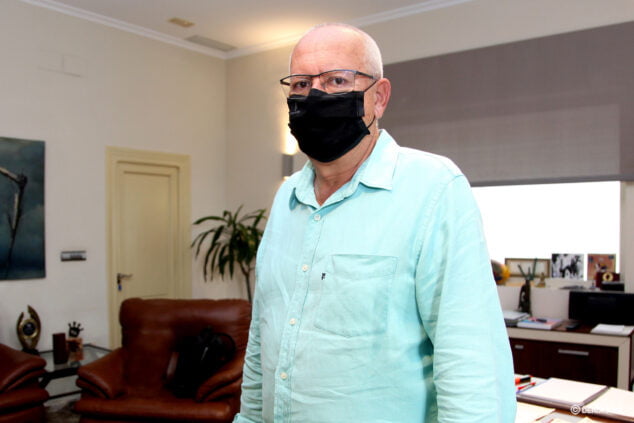
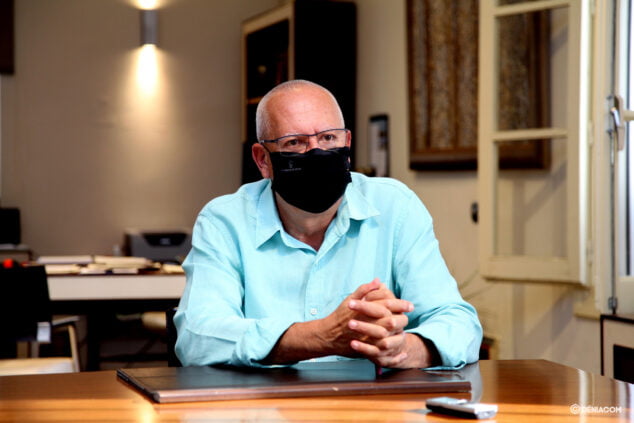
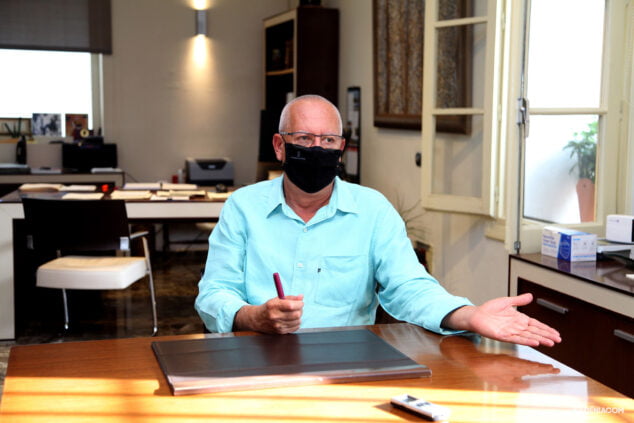

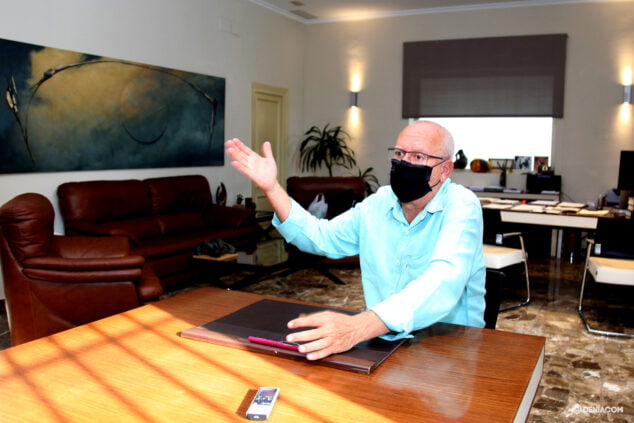

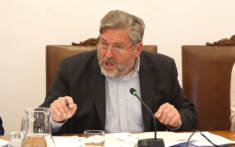
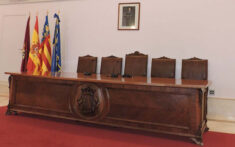



Grimalt put in your Pharmacy a PCR test service at € 123, a price already asked by some laboratories and leave the policy man. You're going to get covered ... even more ...
Please someone tell you to disinfect and clean the streets that are disgusting since May…. That they clean the land of doctor Antonio Muñoz in front of numbers 2 and 4 that is disgusting and has not been cleaned for more than 2 years. Let him put the batteries that the cold drop will come and we cry after what a shame of the town hall